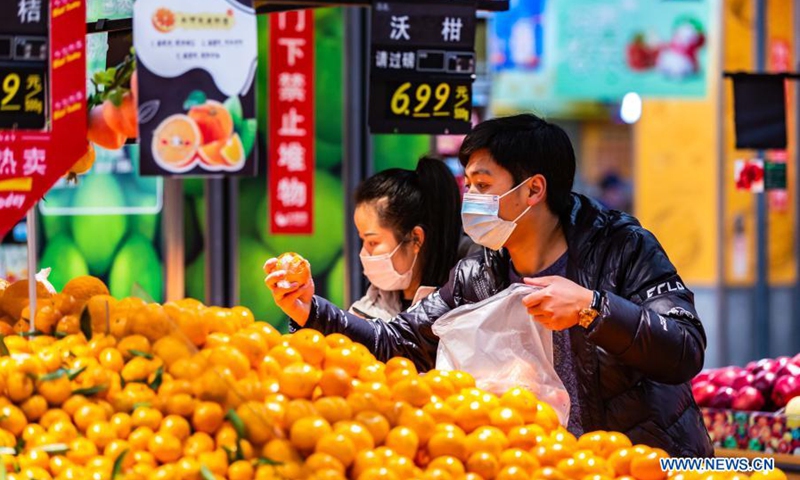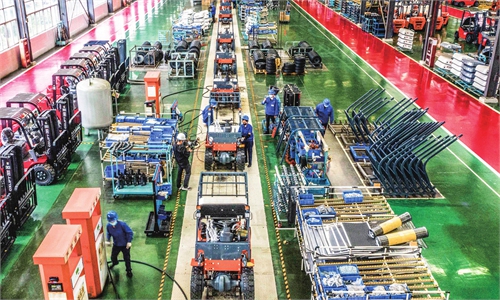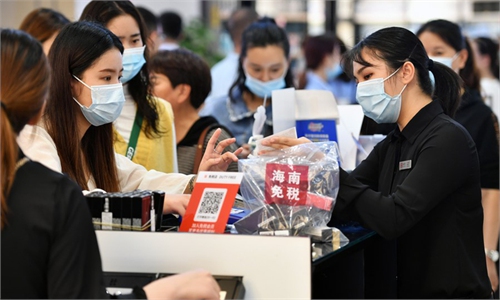
People select food at a supermarket in Xixiu District of Anshun, Southwest China's Guizhou Province. File Photo: Xinhua
Chinese officials on Monday called for more supportive measures to aid businesses in temporary difficulty and promote orderly recovery of consumption as the resurgence of COVID-19 outbreaks across the country since March has weighed on the outlook for consumption growth.Experts believe that supportive measures will play a positive role to boost consumption, while the key to the overall rebound relies on when the latest outbreaks are brought under firm control.
The State Council, China's cabinet, issued guidelines on Monday, calling for more efforts to promote the orderly recovery of consumption and stabilize consumer spending, an important engine of the Chinese economy.
The COVID-19 outbreaks are exerting pressure on China's short-term consumption growth, especially for physical businesses and smaller firms, which are facing rising costs, snarled logistics and growing financing difficulties.
To cope with the impact, the Sate Council has pledged to step up the bailout by reducing taxes and fees for small businesses, helping the retail and catering industries to step up epidemic prevention measures with subsidies, and implementing cuts in electricity fees and rentals, among other measures to stabilize market entities for consumer services.
The authorities also stressed the need to stabilize the supplies and prices of basic consumer goods, and speed up efforts to unblock logistics channels by setting up suburban warehouses to ensure timely transportation of daily necessities in emergency situations.
These measures are expected to improve liquidity for smaller businesses and help them effectively cope with the imminent risks brought by the epidemic, Zhao Ping, vice president of the Academy of the China Council for the Promotion of International Trade, told the Global Times on Monday.
The guidelines also call for increasing employment and incomes to raise consumption capacity.
"On top of that, a major problem we are facing right now is the shrinking consumer demand, and efforts should be made to ensure the sustained growth of incomes, so as to inject stronger confidence into consumption growth," Zhao said.
China's retail sales, a key gauge of consumption, fell 3.5 percent year-on-year in March, the first contraction since August 2020, as recent COVID-19 flare-ups dampened spending. First-quarter retail sales stood at 10.87 trillion yuan ($1.4 trillion), up 3.3 percent year-on-year, data from the National Bureau of Statistics (NBS) showed.
The epidemic will have a short-term impact on consumption, but it will not have a big impact in the long run, Cong Yi, professor at the Tianjin University of Finance and Economics, told the Global Times on Monday, adding that consumption will soon bounce back after the epidemic eases.
"To achieve the consumption rebound, China's 'dynamic zero-COVID policy' must be enforced swiftly to bring the latest outbreak of COVID-19 under control," Cong said.
On the whole, the fundamentals of the Chinese economy remain sound in the long run, and the potential and resilience of the consumer market remain unchanged, Cong said.
In order to boost consumption in the long run, the guidelines issued by the State Council call for unleashing consumption potential through creation and consumption upgrading, such as tapping the growth potential in healthcare, eldercare and childcare, expanding the consumption in culture and tourism, vigorously developing green consumption, and tapping the consumption potential at the countryside and township levels.
"In the long run, policies to boost consumption cover a wide range of areas, and there is still great potential for unleashing the potential of domestic demand," Cong said.



